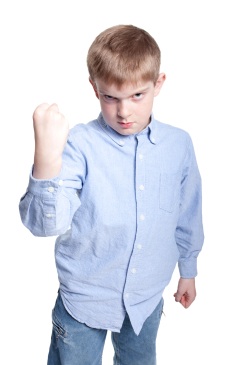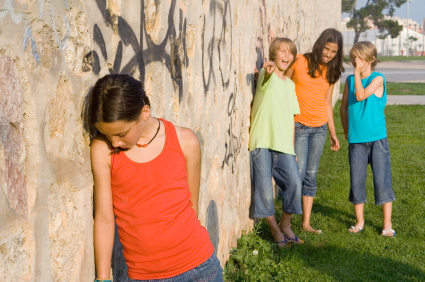 How Are Bullies made?If you really want to understand bullying you need to see it from the inside out and the outside in. Given the right (or wrong) circumstances it can happen to more of us that we might want to believe.
How Are Bullies made?If you really want to understand bullying you need to see it from the inside out and the outside in. Given the right (or wrong) circumstances it can happen to more of us that we might want to believe.
Bullying is about three things:
1. Distorted Power
2. Lack of Empathy
3. Warped Push Back
1. Distorted Power: As children grow up, they are trying to figure out how life works. They quickly hit on power as a pretty important key to success. But at some times and with some kids - their quest for this power goes too far.
2. Lack of Empathy:
We learn empathy by connecting to the experiences of others. We put ourselves in their shoes. Internal senses of empathy toward others often tell us when we have crossed a line and gone too far in our interactions. Most children have these senses innately to some degree. For some kids this trait is neurologically underdeveloped.
Signals of distress in others - facial expressions, tone of voice, emotional reactions such as feeling hurt, upset or angry - help children tap into their empathy. In most children these cues guide us to step back by offering an amends or at least not keep moving in a hurtful manner. How expressive these cues have to be for a given child tells you how developed their empathy is. Some children miss subtle cues. Some miss these cues completely. (I describe children with Asperger's Syndrome as having a reading disability - not with words but with people.)
But how sensitive a child is to these cues is only the first step. Whether it connects to empathy or not is another story. It has also been found that in some children, while they may be able to read these cues their brains are actually wired not to trigger empathy but to trigger pleasure at the awareness of this distress.
The good news is that most children's empathy can be enhanced by helping them notice both their own feelings and the feelings of others. And by pointing out the effect they have on others. Modeling empathy (even toward the aggressor) and pointing out situations where compassion is warranted can help children grow into their empathy.
3. Warped Push Back: Finding our power is an important aspect in life, but HOW do you know if you've gone too far? By getting 'push back'. Kids (and grown-ups) who bully don't get good 'push back':
- From their internal senses of compassion, empathy and guilt
- From parents who either don't point out (with a good balance of empathy and accountability) when a child has crossed the line - possibly because they are unaware, intimidated, or even OK with the behavior - or unfortunately, go to the other extreme and push TOO hard with either consequences or so much shame that it actually makes bullying more likely in the future;
- From teachers and schools who either miss it; turn a blind eye; actually encourage it by elevating certain kids to elite status or laughing along; or unfortunately, like some parents - go to the other extreme and push TOO hard with either consequences or so much shame that it actually makes bullying more likely in the future;
- From other kids who are either not strong enough to stand up to them or who are just so grateful to be friends or followers of these power-craving kids;
Attempts to limit their distorted sense of power (or as they see it - their rights) feels threatening - including other people wanting their own power or rights (rights to exist, to be treated with respect, to sit on a bus and not be hassled, to have an opinion, to be different than YOU, to play on the play structure, to laugh, to sit there, to have friends, or even the right to say something stupid or make mistakes or fumble the football without being condemned).
Here is where the 'push back' does happen - only it is a distorted bullying push back - justified, in the mind of a child or grown-up who is bullying as reasonable or deserved.
 How Are Cliques & Gangs Made? In a typical friendship group, children can have a 'pack mentality' when it comes to power. Weakness is dangerous to a pack, so the group looks for what they perceive as a weak link and try - often through joking, teasing, or embarrassing (but sometimes with more severe forms of bullying) - to change a behavior that threatens the strength of the group.
How Are Cliques & Gangs Made? In a typical friendship group, children can have a 'pack mentality' when it comes to power. Weakness is dangerous to a pack, so the group looks for what they perceive as a weak link and try - often through joking, teasing, or embarrassing (but sometimes with more severe forms of bullying) - to change a behavior that threatens the strength of the group.
With less destructive forms of pressure, and in situations of generally equally-skilled kids, this is actually an opportunity for kids to grow and obtain more skills. The test is whether - when someone crosses the line to more abusive pressure - that they become aware that they have 'crossed the line' or if someone makes them aware with Push Back - ("That was mean", "Knock it off", "Shut up") they find a way to pull back - by either apologizing or just easing up. (Harder to do when they are publicly shamed!)
Sometimes groups of friends become cliques when a 'group think' develops into an over-identified US-Them Complex. When this line becomes too rigid either others are considered 'less than' and fair game for disregard or abuse OR others are seen as a threat to the group and seen as fair game for being picked on, teased, taunted, harassed, shunned or more severely bullied.
Working on breaking the Us-Them Complex is an important part of intervention of this type. Besides instilling empathy, one way to break it is by teaching/showing/helping them see two things: 'different can be ok' and 'we aren't as different as it seems'.
Sometimes you break it by addressing the whole group. Sometimes you break it one person at a time - by encouraging the leaders of the group to rethink their power needs or by working closely with more reasonable members to not go along.
So what to do about bullying? Two words - Get involved! And here are some ways to do that:
Don't Take The Bait - A Bullying Prevention Workshop for Children & Grown-ups or another program to your group.
Check out these articles and resources:
Creating Safe Schools
Standing Up To Bullying
Standing Up to Bullying Roleplays
Bullying Prevention Resources
* For an excellent intervention on working with youth who bully go to: Stop Bullying Now
Need more advice? I would be glad to help.
~~~
Annie Zirkel, LPC is a Relationship & Parenting Consultant based in Ann Arbor, Mi and author of You'll Thank Me Later - A Guide to Raising Grateful Children (& Why That Matters). You can contact her at annie@practicehow.com